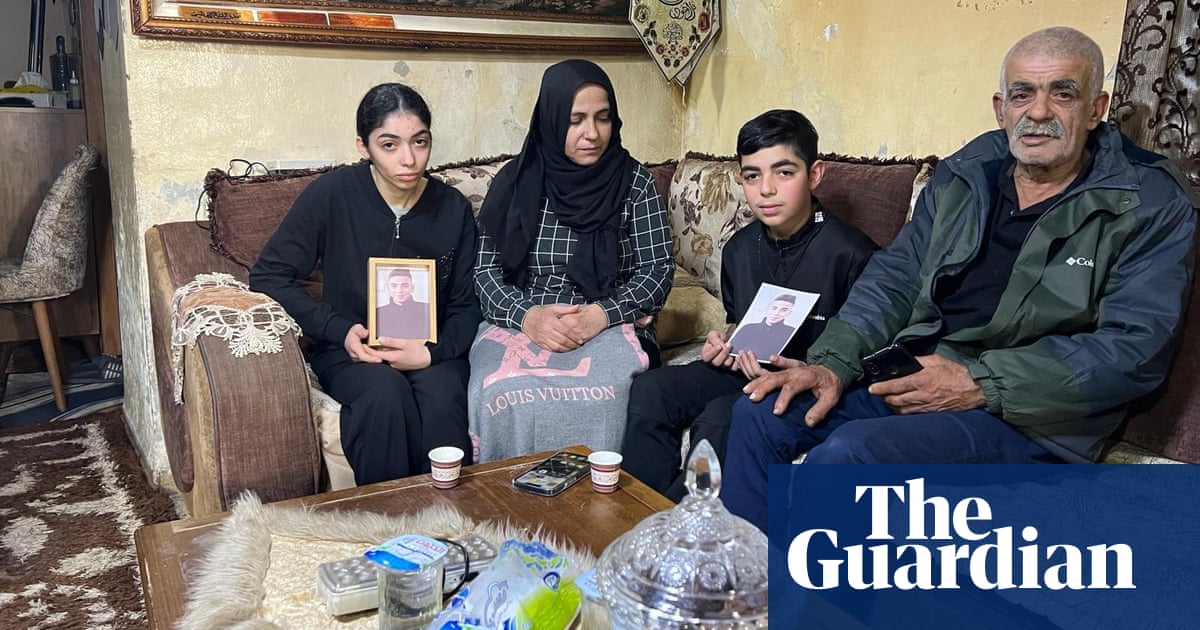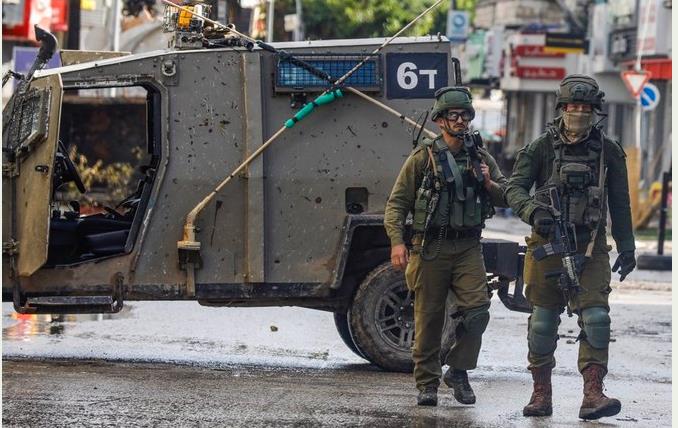
Nihal Abu Ayash was wearing his football kit and carrying his school bag when he was shot in the head and killed after Israeli forces opened fire in the West Bank town of Beit Ummar.
The first bullet reportedly hit the 16-year-old in the leg. He collapsed, and as he tried to stand up, he was shot for a second time in the head, according to the schoolboy’s family.
“It was an execution,” said Ziad Abu Ayash, Nihal’s father. “There was no need to kill him. He didn’t have a gun, he didn’t have a tank. There is no excuse. It is a crime.”
Surrounded by mourners at the family home in Beit Ummar, the 62-year-old added: “I cannot heal. This pain will not leave me. The shock and the devastation will not leave me.”
Nihal was the 100th Palestinian child to be killed in the occupied West Bank since Hamas’s 7 October attack on Israel, according to the human rights group Defense for Children International – Palestine (DCIP).
Nihal was a bright student who dreamed of studying sports at university and becoming a professional football player. The talented goalkeeper was already playing for Beit Ummar football club.
His parents have struggled to come terms with the loss of their first-born son. His mother, Hanan, 47, has been unable to speak or eat and his father has refused to leave the family home, where he spends hours clutching his son’s football boots. The youngest of Nihal’s four siblings, Mahmoud, 13, has developed a stammer since witnessing his brother’s killing last week.
The family said the tragedy unfolded when Israeli forces entered downtown Beit Ummar in armoured vehicles at about 12.30pm on 14 February. They blocked roads in the town, preventing some people from reaching their homes.
Abu Ayash said he called his son to tell him to wait at a nearby family member’s house until the soldiers retreated. Nihal and Mahmoud, who had just left school, went to an aunt’s house.
“Minutes later, I received a call from my daughter saying that she had been told that Nihal was injured. Before I reached the hospital where my son was taken, the mosque declared that he was martyred.”
Ayed Abu Eqtaish, a programme director at DCIP, which documented the shooting, said “confrontations” erupted between Palestinians and Israeli soldiers, who had also taken up positions on the rooftops of buildings. The Israeli forces reportedly responded to the tensions by opening fire.
Mahmoud said he saw his brother being killed by a sniper. The teenager said: “We thought that the army had left, so Nihal went to see what was going on. I followed him. But the moment we were in the street, the army was in our face. We wanted to run away but the army was close.
“They shot Nihal in the leg and he fell down. I went to pick him up, to rescue him, but other people pulled me back. Another person tried to help him and he was shot in the leg. Nihal tried to stand up but they shot him in the head while he was still on the floor.”
Nihal was taken to a medical centre in the town before being transferred to al-Ahli hospital in Hebron. A medical report seen by the Guardian confirmed that a bullet entered the right side of his head and that he was pronounced dead at 4pm.
Fighting back tears, Abu Ayash said: “If only the person who shot my son could be in my shoes. I would ask them: ‘How does it feel to lose your son?’”
The DCIP said that more than 10 Palestinians were injured that day. Abu Eqtaish said the DCIP had been unable to confirm whether Nihal had been involved in the confrontations, which reportedly included stone-throwing, but emphasised: “Whether he was participating or not, he did not constitute any threat to the lives of the Israeli soldiers who were inside their tanks.” Nihal’s family insisted that he had not been involved in the protests.
Violence in the occupied West Bank reached record levels in 2023, according to the UN office for the coordination of humanitarian affairs. It said that 394 Palestinians, including 100 children, had been killed since 7 October.
The Israeli offensive in Gaza has killed 29,410 people. The war, now in its fifth month, was sparked by Hamas’s unprecedented attack on 7 October in which 1,200 people were killed and another 250 abducted.
Abu Ayash said he wanted the people who killed his son to be held accountable. “I’m so angry with the army for killing my son,” he said. “I want those responsible to be put on trial, I want them to be held accountable, like anybody else who commits a crime. Nihal was 16 years old; what did he do for them to shoot him, to execute him?”
The Israel Defense Forces directed all inquiries to the border police, who did not respond to a request for comment.
Guardian Newsroom: The unfolding crisis in the Middle East. On Wednesday 20 March, 7-8.15pm GMT, join Devika Bhat, Peter Beaumont and Ghaith Abdul-Ahad as they discuss the fast-developing crisis in the Middle East. Book tickets here or at theguardian.live












